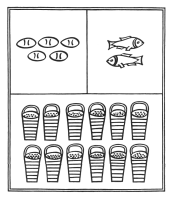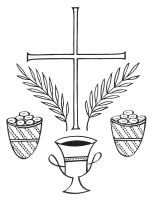Just found this web page that may be of interest to Catholic users: http://catholic-resources.org/Bible/Biblical-Mass-Texts.htm
Biblical Texts related to Catholic Liturgy
compiled by Felix Just, S.J., Ph.D.
[updated for the 3rd Edition of the Roman Missal]
Biblical Background for the Christian Eucharist:
The Catholic Mass is not only based on the "Last Supper" that Jesus had with his disciples, but is also influenced by a long history of special meals celebrated by ancient Jews and early Christians, both before, during, and after the lifetime of Jesus: 
- Abraham and Melchizedek share bread and wine (Gen 14:18-20)
- Abraham provides a meal for the Three Visitors (Gen 18:1-8)
- Israelites in Egypt celebrate the first Passover (Exod 12:1-28)
- Israelites annually share Passover meals (Exod 12:43-51; Lev 23:4-14; Num 9:1-14; 28:16-25; Deut 16:1-8)
- Israelites annually celebrate the feast of Unleavened Bread (Exod 12:14-20; 13:3-10; 23:14-15; 34:18; etc.)
- Prophet Elisha feeds 100 men with very little food (2 Kings 4:42-44)
- Jesus feeds 5000 people in Galilee (Mark 6:30-44; Matt 14:13-21; Luke 9:10-17; John 6:1-14)
- Jesus feeds another crowd of 4000 people (Mark 8:1-10; Matt 15:32-39)
- Jesus tells many parables involving meals and banquets (Matt 22:1-14; 25:1-13; Luke 12:35-40; 14:15-24; etc.)
- Jesus has many meals with disciples and others (Mark 2:15-20; 14:3-9; Luke 14:1-14; etc.)
- Jesus shares his Last Supper with his disciples (Mark 14:12-27; Matt 26:17-30; Luke 22:7-39; cf. 1 Cor 11:23-25)
- The Risen Jesus shares a meal with two disciples at Emmaus (Luke 24:13-35)
- The Risen Jesus has breakfast with disciples at the Sea of Galilee (John 21:1-14)
- Early Christians in Jerusalem share in the "Breaking of the Bread" (Acts 2:42-47)
- Early Christians in Troas "break bread" with Paul (Acts 20:5-11)
- Early Christians in Corinth celebrate the "Lord's Supper" (1 Cor 10:16-17; 11:17-34; cf. Rev 19:9)
- for a compilation of these biblical texts, click here
Use of Scripture in Early Christian Worship:
From the very beginning, Christian worship has not only involved the sharing of bread and wine in a ritual meal, but also included readings from the sacred scriptures (as was and is also done in Jewish synagogue services). Early Christians not only read from the Jewish scriptures, but soon also included some writings of Christian leaders:
- James says the books of Moses have been read aloud in Jewish synagogue services for many generations (Acts 15:21)
- Jesus reads from the book of the prophet Isaiah during a synagogue service (Luke 4:16-22, citing Isa 61:1-2)
- The risen Jesus explains the meaning of the scriptures to two disciples on the road to Emmaus (Luke 24:25-47)
- The apostles base their preaching on the scriptures (Acts 2:14-36; 7:2-53; 17:1-11)
- Christians read from the books of “the Law and the Prophets” (Acts 13:15-44)
- Christians sing the Psalms and other hymns in their worship (Col 3:16; Eph 5:18-20)
- The scriptures are applied to all aspects of Christian life (1 Tim 4:13; 2 Tim 3:16-17)
- The letters of Paul are already considered “scripture” (2 Peter 3:15-17; cf. 1 Thess 5:27; Col 4:16)
Biblical Background of Liturgical Texts:
The words spoken by the priests and the people during the Catholic Mass and other Christian liturgies are not only based loosely on the Bible; many of them are direct quotations from particular biblical texts:

Introductory Rites:
- Sign of the Cross:
- "In the name of the Father, and of the Son, and of the Holy Spirit." (Matt 28:19; cf. John 14:13-14; Acts 2:21)
- Liturgical Greeting:
- "The grace of our Lord Jesus Christ, and the love of God, and the communion of the Holy Spirit be with you all." (2 Cor 13:14)
- "Grace to you and peace from God our Father and the Lord Jesus Christ" (Phil 1:2; Eph 1:2)
- "The Lord be with you." (2 Tim 4:22; cf. Matt 1:23; 28:20)
- People's Response:
- "And with your spirit" (cf. Gal 6:18; 2 Tim 4:22)
- Rite of Blessing and Sprinkling Holy Water (see Ezek 36:25; cf. Num 8:7a)
- Penitential Act:
- Intro: "Let us acknowledge our sins, and so prepare ourselves to celebrate the sacred mysteries." (cf. Ps 51:5)
- "I confess to almighty God..." (cf. Lev 5:5; Neh 1:5-9; Dan 9:3-19; James 5:16)
- "Have mercy on us, O Lord. / For we have sinned against you. / Show us, O Lord, your mercy. / And grant us your salvation." (Ps 41:4)
- "Lord, Have Mercy" (Matt 15:22; 17:15; 20:30-31; cf. Ps 123:3)
- Gloria:
- "Glory to God in the highest, and on earth peace to people of good will" (Luke 2:14; cf. Rev 4:11; 5:11-14)
- "We praise you, we bless you, we adore you, we glorify you..." (Cf. Ps 148:13)
- "Lord Jesus Christ, Only Begotten Son" (cf. Ps 2:7; John 1:14)
- "Lord God, Lamb of God, Son of the Father, you take away the sins of the world..." (cf. John 1:29)
- etc.
- Prayers concluded by "Amen" (Neh 8:6; Ps 41:13; Rom 16:27; Heb 13:20-21; Rev 7:16)
Liturgy of the Word:
- Introductory/Concluding Dialogues:
- "A reading from the book/letter of..."
- "The Word of the Lord" (1 Peter 1:25) - "Thanks be to God" (Rom 6:17; 2 Cor 9:15)
- "A reading from the holy Gospel according to..." - "Glory to you, O Lord"
- "The Gospel of the Lord" (Rom 16:25; Mark 1:1) - "Praise to you, Lord Jesus Christ"
- Acclamations before the Gospel:
- "Alleluia" (many Psalms, esp. Ps 146-150; Rev 19:1-6)
- "Praise to you, Lord Jesus Christ, King of endless glory!" (cf. Ps 24:7-10; 1 Thess 2:12; 2 Tim 4:18)
- "Praise and honor to you, Lord Jesus Christ!" (cf. Dan 4:34, 37; 1 Peter 1:7)
- "Glory and praise to you, Lord Jesus Christ!" (cf. Phil 1:11)
- Profession of Faith:
- "I believe..." (Mark 9:24; John 11:27; cf. John 14:1; 1 John 5:10)
- General Intercessions:
- "We pray to the Lord" (Exod 8:29-30; 10:17-18; Jer 42:2-4; Acts 8:22-24)
- "Lord, hear our prayer" (2 Kings 20:2-5; Isa 38:2-5)
Liturgy of the Eucharist:
- Preparation of the Gifts:
- "Blessed are you, Lord God of all creation..." (cf. 1 Chron 29:10; Ps 72:18-19; 119:10; Luke 1:68)
- "Blessed be God forever. " (cf. Gen 14:20; Ps 66:20; 68:35)
- Eucharistic Acclamations:
- "Holy, Holy, Holy Lord God of hosts..." (Isa 6:3; Rev 4:8)
- "Blessed is he who comes in the name of the Lord." (Ps 118:26; Mark 11:9; Matt 21:9; Luke 19:38; John 12:13)
- "Hosanna in the highest" (Mark 11:10; Matt 21:9; cf. Luke 19:38)
- Words of Institution: (see Mark 14:22-24; Matt 26:26-28; cf. Luke 22:17-20; 1 Cor 11:23-25)
- "Take this, all of you, and eat of it, for this is my Body, which will be given up for you" (a combination of Mark 14:22; Matt 26:26; Luke 22:19; 1 Cor 11:24)
- "Take this, all of you, and drink from it, for this is the chalice of my Blood, the Blood of the new and eternal covenant, which will be poured out for you and for many for the forgiveness of sins." (a combination of Mark 14:24; Matt 26:27b-28; cf. Luke 22:17, 20; 1 Cor 11:25)
- "Do this in remembrance of me" (only Luke 22:19; 1 Cor 11:24a, 25b)
- Memorial Acclamations:
- "We proclaim your Death, O Lord, and profess your Resurrection until you come again." (cf. 1 Cor 16:22)
- "When we eat this Bread and drink this Cup, we proclaim your Death, O Lord, until you come again." (cf. 1 Cor 11:26)
- "Save us, Savior of the world, for by your Cross and Resurrection you have set us free." (cf. Matt 8:25; Luke 4:42; Rom 8:21)
- Lord's Prayer:
- "Our Father in heaven..." (Matt 6:9-13; cf. Luke 11:2-4; Mark 14:36; Gal 4:6)
- Embolism: "Deliver us, Lord, we pray, from every evil... as we await the blessed hope and the coming of our Saviour, Jesus Christ" (Titus 2:13)
- Doxology: "For the kingdom, the power, and the glory are yours..."
(found only in some biblical manuscripts after Matt 6:13; cf. Rev 4:11; 11:15; 1 Chron 29:11)
- Greeting of Peace:
- "Lord Jesus Christ, you said to your apostles, 'I leave you peace, my peace I give you'" (John 14:27)
- "The peace of the Lord be with you always." (cf. John 16:33; 20:19, 21, 26)
- Breaking of the Bread:
- "Lamb of God, you take away the sins of the world..." (cf. John 1:29, 36; Rev 5:6-13; 22:1-3)
- Preparation before Communion:
- "Behold the Lamb of God, behold him who takes away the sins of the world. Blessed are those called to the supper of the Lamb." (John 1:29, 36; Rev 19:9)
- "Lord, I am not worthy that you should enter under my roof, but only say the word and my soul shall be healed." (Matt 8:8; cf. Luke 7:1-10)
Concluding Rite:
- Final Blessing (cf. Gen 28:3; Deut 14:29; Num 6:23-27; Ps 29:11)
- Dismissal:
- "Go forth, the Mass is ended."
- "Go and announce the Gospel of the Lord." (cf. Mark 16:15)
- "Go in peace, glorifying the Lord by your life." (cf. Ps 115:1; 1 Cor 10:31; 2 Thess 1:12)
- "Go in peace." (cf. Exod 4:18; Deut 10:11-13; Judg 18:6; 1 Sam 1:17; Mark 5:34; Luke 7:50; 8:48)
The Liturgy of the Hours and Other Prayers:
- The Canticle of Mary (Magnificat):
- "My soul proclaims the greatness of the Lord..." (Luke 1:46-53)
- The Canticle of Zechariah (Benedictus):
- "Blessed be the Lord, the God of Israel..." (Luke 1:68-79)
- The Canticle of Simeon (Nunc Dimittis):
- "Lord, now let your servant go in peace..." (Luke 2:29-32)
- The Hail Mary (Ave Maria):
- "Hail Mary, full of grace, the Lord is with you." (Luke 1:28)
- "Blest are you among women, and blessed is the fruit of your womb." (Luke 1:42; cf. Deut 7:12-13; 28:4)